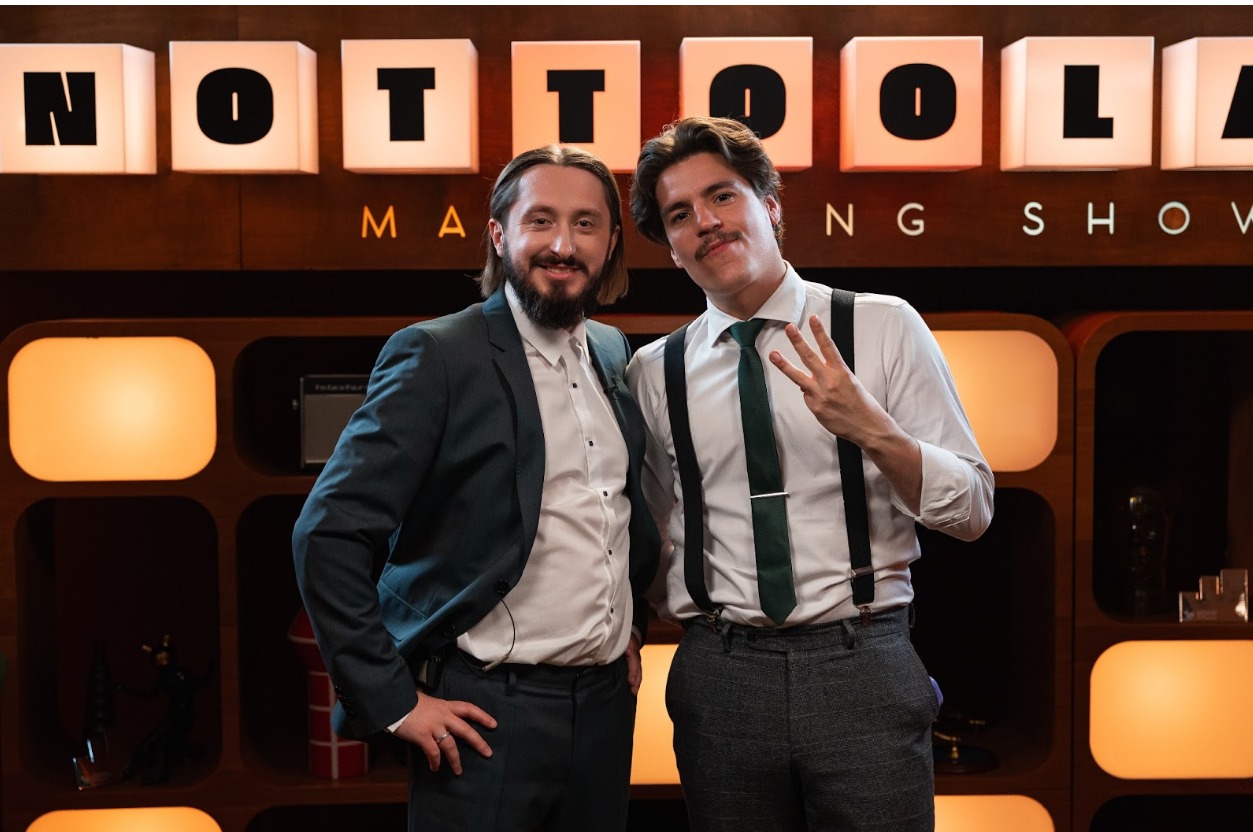“Brands will not survive without meaning and culture”: 5 insights from Alexander Khomenko
8 July 14:36
The guest of the sixth edition of the Not Too Late Show was Oleksandr Khomenko, a cultural activist, playwright and co-founder of the MUR cultural association, which over the past few years has become an example of how a team without large resources and systemic support can create performances, launch awards, record albums and remain flexible in choosing formats, "Komersant Ukrainian" reports
Together with the host of the showSerhiy Kostya, they discussed what it means to create meaning today, why it is important to be present in Ukraine, even if it is difficult, and how culture can work as a real tool of influence. We have collected five main insights from the conversation that apply not only to artists, but also to anyone who works with people, content, or meanings.

1. Creating meaning is not an abstract phrase, but a concrete action here and now
“Today, creating meanings is simply working here. To be in Ukraine. To support what is ours,” the activist explains.
When we hear phrases like “doing something with meaning,” it often sounds like something general and vague, but Oleksandr explains very specifically: being present means not hiding, not being silent, not waiting for it to be convenient, but continuing to act within your capabilities, and doing it every day.
And it is this presence, even if it does not have a high-profile reach or financial stability, that is already changing the environment and shaping the cultural background in which we all live and work.
As Serhiy Kostya notes: “Today, it is not the one who is louder who wins, but the one who speaks first about the main thing.”
2. Being a Ukrainian is not always easy, but that is what makes us stronger
“It’s like Dark Souls. It’s very hard, you die all the time. But when you pass, it’s a completely different pleasure.”
Life in Ukraine, especially in wartime, is not about comfort or predictability, but rather about daily work on yourself, on your endurance, emotions, and faith in what you do. But it is precisely in this complexity that depth emerges-because if something is difficult, it usually has more meaning for you than something that came easily. And this logic works not only with identity, but also with communication: something that is difficult should not be made easier – it should be explained, shown, and lived together with the audience, because that is how trust arises.
3. Ideas can unite people even before the product itself appears
“We sold tickets to a show that didn’t exist yet. We just said we were going to make a musical and started working,” says Oleksandr.
MUR announced the upcoming performance, raised money at the stage when there was no ready-made text, and then wrote it, combining the process of creation with the process of rehearsals. People did not buy tickets to the show, but the right to join something important that was still in its infancy. It’s a familiar model in startups or crowdfunding, but MUR shows how it works in culture-when you give meaning and passion even before the result appears, and that’s what unites people around the project.
“A good brand should have a core around which trust is built, not just a product that is bought,” Serhii adds in the conversation.
4. Criticism can be useful, but not all criticism is constructive
“When you are criticized on the merits, it even helps. But when there is toxic hate, it is really demotivating.”
In an open cultural environment, criticism is part of the process. But it often crosses the line when resentment or aggression appears instead of feedback, and when the team works almost for free, while creating content, rehearsing, communicating, and seeking support-it’s really exhausting.
That’s why it’s important not only to create new things, but also to create a normal, safe environment where people can make mistakes, change, and try things without fear of being destroyed in the comments.
5. TikTok and memes are not the opposite of content, but its new format
“If a meme made a person google who Tychyna is, it means it’s already working.”
MUR does not avoid light formats and does not consider them “frivolous.” They actively use TikTok, Instagram, memes, and excerpts from performances because they understand that sometimes the first contact with culture is not through a play or an article, but through a joke or a random reel. The format does not devalue the idea if the idea is really strong, and this rule works both in theater and in branding.
Why should you watch this episode?
The conversation will be useful for anyone who works with communication, content, brands, or cultural initiatives. It includes practical examples: how to build trust in an idea before launching a product, how to adapt content on TikTok or memes, how to respond to criticism and work with an audience without an advertising budget.
This issue provides a clear understanding of how the new cultural logic works today-when projects are built around an idea, not vice versa, and when content is more important than format.
Behind the scenes
The first season of Not Too Late Marketing Show was created in partnership with the Ukrainian Marketing Forum and Starlight Media.
Production: Manifest Production – a team whose manifestos, videos and advertising campaigns have been seen by millions of Ukrainians.
Where to watch
You can watch the new issue here:
https://www.youtube.com/watch?v=OU6AA4q6vVU









